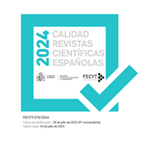The prosody on narratives of basque national identity
Resumen
In this paper the role that prosody plays in oral narratives will be analysed drawing on Wennerstrom (2001) framework on prosody in discourse analysis. For this paper, I will use the recording of several topic oriented qualitative interviews in which the speakers had to expose her ideas about their beliefs and attitudes towards Basque national identity. These interviews followed a protocol in which the subjects had to answer questions about different aspects of national identity, these questions were grouped around several thematic areas (question sets) following De Cillia et al. (2000) methodological approach. This analysis will show how the argumentation in “narratives of national identity” is not only organized lexicogramatically (as in De Cillia 2000 analisis of narratives of national identity) but also prosodically by the use of high pitch accents to “highlight” certain ideas, and low pitch accent to “background” others. I will also observe how deictical elements aligned with prosody serve to systematise the structure of discourse, and how evaluative language, e.g epistemic modality (Palmer1986, Simpson 1993) lined up with prosody serves to emphasise or diminish the point of view of the speaker’s. In this sense, evaluative lexical items align with high pitch accents the moment the speaker desires to highlight the truth value of the proposition. However, they can also be backgrounded when they are embedded in ideas that are peripheral to the main ideas or in parenthetical. Besides this the speaker employs prosody to emphasize loaded lexical items or words that contribute to the climactic essence of the narration. Therefore prosody helps in the expression of subjectivity and directly in the modalization of speech. In essence, this research can enlighten the study of intonation in discourse analysis.
Descargas
Descarga artículo
Licencia
La revista Círculo de Lingüística Aplicada a la Comunicación, para fomentar el intercambio global del conocimiento, facilita el acceso sin restricciones a sus contenidos desde el momento de su publicación en la presente edición electrónica, y por eso es una revista de acceso abierto. Los originales publicados en esta revista son propiedad de la Universidad Complutense de Madrid y es obligatorio citar su procedencia en cualquier reproducción total o parcial. Todos los contenidos se distribuyen bajo una licencia de uso y distribución Creative Commons Reconocimiento 4.0 (CC BY 4.0). Esta circunstancia ha de hacerse constar expresamente de esta forma cuando sea necesario. Puede consultar la versión informativa y el texto legal de la licencia.











